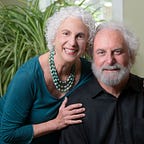Falling in Love Again and Again
Linda: According to Ellen Berscheid and Elaine Walster, passionate love is defined as “a wildly emotional state in which tender and sexual feelings, elation and pain, anxiety and relief, altruism and jealousy co-exist in a confusion of feelings.” We crave to be close to our beloved, yet this early state of passionate love is chaotic. If it looks as if both parties are drugged, they are.
It’s nature’s trick to keep the species multiplying by naturally drugging them with oxytocin and dopamine. This love cocktail makes both parties a bit crazy and obsessed with each other, lasting about six months. Many people lose their relationship at the point that infatuation ends, believing that it’s not true love after all. But it’s only the high wearing off, offering them the opportunity of mature love.
The fire of passionate love has too much illusion and fantasy to be true love. They don’t know each other well enough yet to know who they are actually with, so they make up stories to fill in the holes. To ride out the period of disillusionment allows for the opportunity to deeply know the other and to be known in return, developing into true love, a committed marriage that can endure for a lifetime.
The wild ride calms down to give way to companionate love, which is defined by Bersheid and Walster as “the affection we feel for those with whom our lives are intertwined.” Leaving the infatuation stage may not be the only time there is a falling out of love, creating fear that the partnership is over.
Occasionally I’m asked, “Can you make yourself fall in love?” You can’t exactly make yourself fall back in love, but what you can do is create conditions that are conducive to falling in love. With effort, a relationship that has gone flat can be resuscitated.
Here are some ideas for conditions that can be put in place:
Remember the activities that you’ve enjoyed participating in together. Make a full-hearted commitment to do those activities together, so pleasure will flow back into the relationship.
Reprioritize your life. When you place the well-being of the romantic partnership at the top of the list, your focused attention will bring positive results.
Move out of the avoidance pattern. Taking time for intimate conversations helps a great deal.
Go on a “blame fast.” A cessation of blame (overtly and internally) that causes resentment gives way to a higher level of responsibility.
Learn to discipline your mind away from thoughts of a real or imagined lover. Consistently dismiss the thoughts of the competitor to come back to your partner.
Make a determined effort to handle incompletions. Take them out to discuss with a spirit of goodwill; learn to understand and to be able to forgive past hurts.
Commit yourself to learn more about who your partner is at the core of their being. Know them more intimately by stretching into their world, having empathy for what they feel, understanding their thought process, and learning their love language, which is the special way they feel honored and loved.
Move away from being judgmental to be more open-hearted.
Bring back the spirit of adventure that characterized the earliest stage of the relationship. Branch out into experiences that enliven your relationship.
Have a frank discussion about what does and does not work in the sexual area of the partnership. Acting on the new information can bring back the sparkle.
Use any fantasies of the imagined perfect partner to identify what you are longing for. Risk speaking about those not-yet-met needs to provide profound information for both of you to use to strengthen the bond.
All of the above ideas are subcategories underlying a higher level of responsibility. The negativity, hopelessness, and despair that’s like a heavy wet blanket on the delicate and fragile feelings of love can be lifted with a fresh new energy of possibility so that discovery can flow into the relationship. And with a new beginning, the old dried-up relationship can spring back into a healthy, wholesome form where love can become strong once again.
As partners grow to rely on, care for, and trust each other, a calm and deep kind of love emerges, holding the two people together. All the strongest, most successful marriages are those that are basically companionate, but the smart partners know how to sprinkle in the passion that keeps things interesting and alive.
We’re giving away 3 e-books absolutely free of charge. To receive them just click here. You’ll also receive our monthly newsletter.
